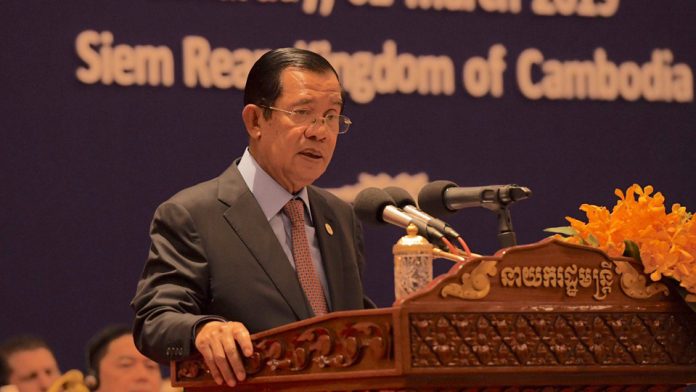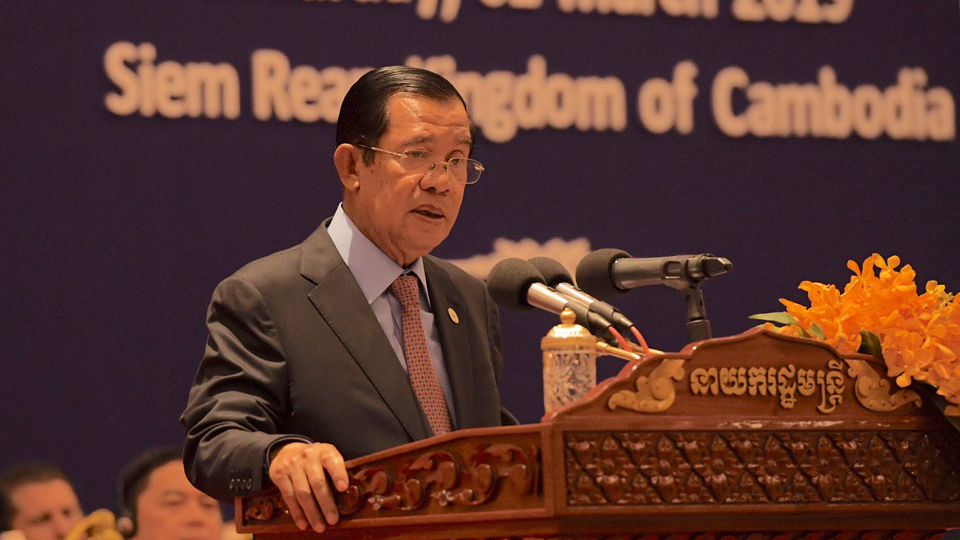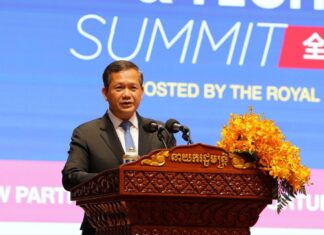Excellencies Ministers of the RCEP Participating Countries;
H.E. Lim Jock Hoi, Secretary General of ASEAN;
Excellencies, Ladies and Gentlemen!
Today I am delighted to participate in the opening ceremony of the 7th RCEP Intersessional Ministerial Meeting which is the ASEAN’s initiative and initially began the negotiation in 2012 during the 21st ASEAN Summit in Phnom Penh, Kingdom of Cambodia, including 16 participating countries that are 10 ASEAN member countries and 6 ASEAN Free Trade partner’s countries, which are Australia, China, India, Japan, South Korea, and New Zealand.
I would like to welcome and thank Excellencies, Ministers, and distinguished delegates from the RCEP negotiating countries who are now having presence on the land of Angkor in Siem Reap province, which is the well-known historical center of Cambodia.
At this moment of the world today, the multi-lateral trade system, which has free and open features, is in tough situation facing serious threats, since some countries including the mega-powers are holding a unilateral and bilateral policy which only consider about their own benefits that lead to the rise of protectionism and also have impact on the free trade within the region of RCEP member countries. Therefore, we shall try to conclude the negotiation of this important free trade agreement within the set timeline. So far, I have encouraged our fellow ministers and negotiation working groups to discuss at the sectoral bodies with the continued effort to conclude the negotiation as mandated by the RCEP Leaders, although Cambodia is required to carry out rigorous reforms on a number of legal documents and be more flexible with some other partner countries.
At the same time, we have been aware that the population of RCEP from 16 countries is 45% of the world population, which consists of almost 30% of the world GDP, whereas the RCEP countries trade comprise of 28.5% of the world trade, and the production of RCEP countries contain 31.6% of the world production, while the foreign direct investment flow of the RCEP countries cover one fifth of the world foreign direct investment flow by 2016.
Thus, the hosting of this 7th RCEP Intersessional Ministerial Meeting today is truly significant, yet the negotiation of this mega free trade agreement is truly hard and complicated, given the fact that the 16 RCEP member countries do have different economic situations. Nevertheless, I hope that when the negotiation has reached to an end with transparency, all RCEP participating countries will receive many benefits from this multilateral trade.
Cambodia has a great honor once again to host this 7th RCEP Intersessional Ministerial Meeting at this moment. Meanwhile, Cambodia as well as other RCEPmember countries would like to congratulate on the progress of negotiation that is now successfully moving into the final stage of negotiation, and I would like to also thank Indonesia who is acting as a lead negotiation facilitator.
With this spirit, I would like to share some recommendations as the basis for consideration and negotiation as follows:
First: All member countries of the negotiation party of the Regional Comprehensive Partnership Agreement shall consider this negotiation as a “Win-Win” process that all parties can accept and the outcome of this negotiation will provide numerous benefits to all the parties even at any different levels.
Second: All members of negotiating countries, although with different economic agenda, shall review this RCEP agreement with high spirit of responsibility on overall aspect that has potential and benefit to make this negotiation process smoothly and to overcome all the outstanding obstacles in order to conclude this negotiation timely with transparency.
Third: I would like to appeal to all member countries that participated in negotiating RCEP agreement to have political will and provide guidance to the members of this negotiating committee with flexibility, understanding and mutual benefit in accordance with the adopted guiding principles since 2012 during the 21stASEAN Summit in Phnom Penh. More specifically, for the RCEP member countries that are developed with better economic situation shall have willingness to offer special treatment and open market access to least developed countries (LDCs) that have small economic size in order to encourage these countries to actively participate in the multilateral free trade movement with transparency.
I believe that all member countries will have joint political commitment to successfully conclude this RCEP agreement in 2019, in which Thailand is the Chair of ASEAN as in line with the commitment of leaders during the 2nd RCEP Summit on 14th November 2018 in Singapore in order to move on negotiating other free trade agreements in the region.
[Start of Extempore Comment]
RCEP Could Lead to Success of a Free and Open Indo–Pacific Concept (FOIP)
Please allow me to add a little more that the agreement that we are working to conclude is not only for simple economic achievement alone but also for a wider concept of a free and open Indo-Pacific (initiative). Let me share my brief impression on initiatives taken in the framework of ASEAN. Indonesia has launched its initiative of Indo-Pacific strategy. Elsewhere in the region, India champion its policy of looking east, which is under fulfilment now. South Korea also works on concept of looking south. Japan has been talking about FOIP. China also has its concept of one belt one road. All these together have been agreements that we are working on to establish a comprehensive economic partnership in the region.
Synthesizing Economic Initiatives for Regional Harmonization and Prosperity
Should we come to agreement (on RCEP) it would be more than half of success of every agreement issued so far. I hope that the ten ASEAN member countries and its 16 partnering countries who have been developing more or less similar initiatives to work for this agreement achievement. We could work together to synthesize India’s Looking East, RoK’s Looking South, Japan’s FOIP, Australia’s Indo-Pacific Strategy and China’s One Belt One Road – for the sake of harmonization and prosperity in the region. If we could not conclude this agreement, those initiatives would also not be realized. Should we conclude this agreement, there would be trust and coordination in the region not only in economic but also political and other issues.
To Amend Laws for RCEP
I had a brief meeting with the Singapore Minister and we discussed about connectivity, which also include soft or legal issues. I already mentioned it above. Cambodia is ready to amend its related laws and regulations to get a conformity with RCEP. We will have to do it. We also have done it to suit demands of the World Trade Organization. Well, that is how I briefly see how we should go about with regional grouping concepts working together to ensure full peace and cooperation. I am sure it is also a part of efforts to resist protectionism and unilateralism that is leading to liberalization and its universalness.
[End of Extempore Comment]
At the end, with the Opening of the 7th RCEP Intersessional Ministerial Meeting, I would like to wish Excellencies, Ministers and distinguished delegates of RCEP negotiation a great success for the regional economic benefit, and I wish you all the best of health, good memories, and pleasant stay in the well-known land of Angkor of the Kingdom of Cambodia.
Thank you!







![Special Lecture by Samdech Akka Moha Sena Padei Techo HUN SEN, President of the Senate of the Kingdom of Cambodia, on “Leadership Experiences and Vision for Peace” to the 11th Plenary of the International Parliament for Tolerance and Peace (IPTP) [Unofficial Translations]](https://pressocm.gov.kh/wp-content/uploads/2024/12/468161445_1188047276010391_3141496335218348185_n-100x70.jpg)
